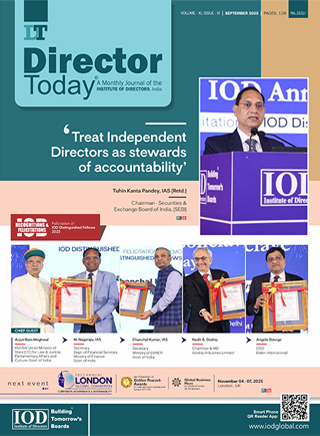Travel on Hold

Look-Out Circulars and the Independent Director's Dilemma
Independent directors & their role
The role of independent directors is an important common feature in all mature and emerging economies around the world, especially when there are retail investors in listed companies. They are primarily appointed to the boards of listed companies to protect the rights and interests of retail investors. Such independent directors are also appointed to the board committees to bring independence of thought and balance to committee conversations. An independent director may often be seen heading the committees on audit, compensation, corporate social responsibility, investor relations, etc.
When companies with ID’s default, it is possible that an ID could be stopped at the airport.
Being a member of a board is a serious position. It is never easy to ask the right and probing questions to the promoters or management team, which appointed them in the first place. This oversight activity has to be done in a very subtle manner, with all respect and graciousness. The role of independent directors in India is regulated by the Securities and Exchange Board of India (SEBI), which is the primary regulator for listed companies. However, other regulators, like the Registrar of Companies (RoC), the Reserve Bank of India (RBI), or other regulators, seek to make independent directors responsible for certain acts and/or decisions.
So, who generally becomes an independent director? People who qualify to be independent directors should ideally carry with them a blend of sound industry experience, robust subject knowledge, and preferably a reasonable academic background. The role of independent director also requires soft skills such as good oral communication and reasonable working knowledge of the law. The current regulations provide that all independent directors other than practicing chartered accountants, cost accountants, and company secretaries must pass a qualifying examination. However, the onerous responsibilities cast on independent directors have resulted in many professionals not applying for these posts. Many of the independent directors are thus retired professionals.
There is a shortage of independent directors in our country. The problem is likely to be more accentuated now, since the first set of independent directors appointed ten years ago for two consecutive terms will retire this year and have to undergo a cooling period of three years before reappointment on the same board.
SEBI places many responsibilities on the independent directors. Most recently, the Chairperson of the National Financial Reporting Authority (NFRA) remarked that the independent directors, especially the ones in the Audit Committee, must have two-way conversations with the auditors and cannot escape any charge of fraud because the auditors did not qualify them. That brings in the NFRA as one more regulator. As can be seen from the above, the role of an independent director is onerous and important.
Independent Directors must be vigilant about situations involving Look-Out Circulars, especially when companies default on loan commitments. They should be aware that their liability is confined to matters specifically mandated by regulations from SEBI and MCA.
Look-Out Circulars (LOCs) by banks
Of late, there has been a growing trend among PSU bankers to ask for the passport details of independent directors. So the question arises as to why they need the passport details of the independent directors. To answer this, we need to go into the history of 1979, when the concept of the Look-Out Circular (LOC) was introduced. The LOC was generally meant to prevent people who work against the country's interests from fleeing the country. This was meant to be used against hardened criminals, not businessmen. However, some businessmen took advantage of the lack of such mechanisms and absconded from the country.
In 2000 and 2010, there were administrative reforms that improved the process of issuing Look-Out Circulars (LOCs), and there were strong justifications required. Thus, in 2018, the Finance Ministry issued an advisory and granted powers to the PSU banks to issue LOCs and to the Serious Frauds Investigation Office (SFIO) to investigate corporate frauds assigned under Section 212 of the Companies Act, 2013.
In an answer to the questions raised in Parliament in 2018, it was disclosed that LOC became necessary to prevent bank fund embezzlers from fleeing the county. It was widely felt that this was a result of the 'Telephone Banking' (of prior years), where political masters would call public sector banks to give loans to their 'friends' who would flee. The ratio of total gross non-performing assets (GNPA) to total advances in 2013 was a dangerous 4.3%. The banking stability indicators were the lowest in 2010. The heat was turned on in 2018. With the authorities cracking the whip, defaulters fled the country one after the other. That made it necessary to give such power to the PSU banks to issue Look-Out Circular (LOC) at the level of the chairman. As a result of such actions and amendments to the Insolvency and Bankruptcy Laws (IBC), the GNPA has fallen to a decadal low of 3.9% in early 2024.
The language of this advisory from the Finance Ministry was in the context of promoters, executive directors, or authorized signatories to be covered under the LOC. The advisory did not specify anything about independent directors. Regulations, acts, advisories, and rules have to be read in the context of the situation and cannot be blindly applied. In this case, it was very clear that it was only the executive team of a company since they are the decision-makers and have information. The independent directors have information only during board meetings. As such, they have limited time to ask the relevant questions.

Bank/ lender's safeguarding their own interest
The banks have the power to appoint Nominee Directors to keep a watch on the Board. Banks also routinely ask for monthly/ quarterly MIS statements and stock/ debtor statements where working capital facilities are involved.
If at all, anyone has access to information on a regular sustained basis, it is the lender and not the independent director. So how does the independent director become liable?
When companies with independent directors default, it is possible that an independent director, despite having no executive role, could be stopped at the airport and prevented from traveling. Consider the situation of someone traveling for medical or unrelated professional reasons being unexpectedly detained. Unfortunately, banks often request passport details without distinguishing between executive and independent directors. This underscores the need for independent directors to exercise extra caution.
Getting such names from the list is a torturous one, and requires going back to the originating agency, which in this case are the banks. The banks are unlikely to take the names of the independent directors off the list for two major reasons. Firstly, it gives them leverage with the promoters and secondly, in the event of an investigation by some central agency, they can state that they put all the directors in the dock. This is not a fair approach.
The Bombay High Court ruled that Look-Out Circulars (LOCs) cannot be issued on a very casual basis in the case of Viraj Chetan Shah v. Union of India and Ors. (April 23, 2024). This judgement was a combined judgement on 38 petitions. The Court further said that this can be done so only where it is likely that a defaulter may evade arrest or there is a risk of evidenced flight. The Mumbai HC judgement, however restricts the ability of the Public Sector banks to stop Directors through LOC's long as they fully justify that the exit of such a person would cause harm to the economic interests of the country by evading arrest. The High Court has ruled that every situation cannot damage the economic interest of the country. Further, it observed that such powers cannot be delegated to the Public Sector Banks who are lenders and therefore have a conflict of interest. The right to travel freely is a fundamental constitutional right, and any restrictions on this right, such as arrests, should be exercised solely by statutory authorities, including the courts. This ruling seeks to strike a balance between protecting banks' interests in loan recovery during defaults and upholding the fundamental rights of citizens guaranteed by the Indian Constitution.
However, this judgment fell short of exempting Independent Directors from Look-Out Circulars (LOCs) because no petition was ever made to the Court or the Indian Banks' Association to seek such an exemption. It's crucial that this matter be addressed with lenders to ensure a clear distinction between Executive and Independent Directors, protecting the latter from undue restrictions.
Conclusion
Based on the Bombay HC ruling one can infer that there is no case for an independent director to submit passport copies to any bankers, as the situation under which Look- Out Circular can be issued has now been restricted by the latest judgement
Independent directors must be vigilant about situations involving Look-Out Circulars, especially when companies default on loan commitments. They should be aware that their liability is confined to matters specifically mandated by regulations from SEBI and MCA, and they are not responsible for issues beyond those regulatory requirements.
It is advisable that the LOC advisories may themselves be transformed into a law to address this problem and put the issue to rest.
Author

CA Aditya Sesh
He has over 30 years of experience in fund services across Europe, the Caribbean, and the US. He founded Basiz Fund Services in 2004, a top global fund administrator managing over $150 Billion in assets. He is a member of the GoI (Ministry of Agriculture & Farmers' Welfare) Expert Committee, promotes employment, and engages in community service.
Owned by: Institute of Directors, India
Disclaimer: The opinions expressed in the articles/ stories are the personal opinions of the author. IOD/ Editor is not responsible for the accuracy, completeness, suitability, or validity of any information in those articles. The information, facts or opinions expressed in the articles/ speeches do not reflect the views of IOD/ Editor and IOD/ Editor does not assume any responsibility or liability for the same.

 Quick Links
Quick Links
 Connect us
Connect us




 Back to Home
Back to Home































